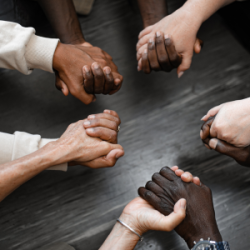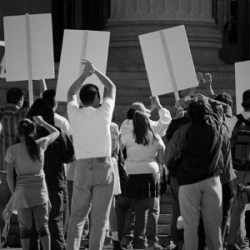Welcome readers! Please subscribe through the buttons at the right if you enjoy this post.

“And yet I’m torn when I watch the toll it takes on my LGBTQ friends to repeatedly explain these passages. Speaking about them does not have the same emotional cost for me as it does for them. Perhaps I have been a little too silent. I haven’t been silent in my affirmation. But I may have been too silent on some of the ways I arrive at affirmation. So in this series, I want to amplify two voices on this topic.”
Last January, I spent the last two weekends in the company of LGBTQ Christian communities. Every time I spend time with communities like these, I am deeply moved by their compassion, insight, and wisdom. The people I’ve met have always failed to match the mischaracterizations that homophobic, biphobic, and transphobic Christian communities assign to them. I walk away from each experience with a deeper understanding of my own faith and what it means for me to follow Jesus today our work of love, compassion, action, and justice.
During these visits I bumped into a high school friend who I haven’t seen since graduation. He told me of his sister, a deeply Christian lesbian woman, who recently married the love of her life, a pastor. On the morning of her wedding, her mother sent her a very ugly email. This mother, who had refused to attend the wedding, wrote this message to her daughter: “What you’re doing today makes me want to go jump off a bridge.”
When I heard this story I sat aghast. What is it about anti-LGBTQ Christianity that causes parents to so deeply reject and shame their own children? I have yet to understand this.
For many Christian parents, discovering their child is attracted to those of the same sex or identifies with a different gender than the one on their birth certificate begins their journey of discovering that everything their faith tradition has taught them of the LGBTQ community has been deeply misinformed at best and intentionally maligning at worst. They discover they were wrong.
But far more parents in these same faith traditions don’t make this journey. Far more often, parents reject their own children in order to be faithful to their anti-LGBTQ faith. Religion can be a powerful force of good in the world. It can also be a powerful force of the worst kinds of evil.
I want us to consider a story from the gospels of Mark and Matthew where Jesus was also mischaracterized and maligned. Jesus has strong words here for those who malign that which is holy, just, and good and call it evil.
“But when the Pharisees heard this, they said, ‘It is only by Beelzebul, the prince of demons, that this fellow drives out demons.’ Jesus knew their thoughts and said to them, ‘Every kingdom divided against itself will be ruined, and every city or household divided against itself will not stand. If Satan drives out Satan, he is divided against himself. How then can his kingdom stand? And if I drive out demons by Beelzebul, by whom do your people drive them out? So then, they will be your judges. But if it is by the Spirit of God that I drive out demons, then the kingdom of God has come upon you. Or again, how can anyone enter a strong man’s house and carry off his possessions unless he first ties up the strong man? Then he can plunder his house. Whoever is not with me is against me, and whoever does not gather with me scatters. And so I tell you, every kind of sin and slander can be forgiven, but blasphemy against the Spirit will not be forgiven. Anyone who speaks a word against the Son of Man will be forgiven, but anyone who speaks against the Holy Spirit will not be forgiven, either in this age or in the age to come. Make a tree good and its fruit will be good, or make a tree bad and its fruit will be bad, for a tree is recognized by its fruit. You brood of vipers, how can you who are evil say anything good? For the mouth speaks what the heart is full of. A good man brings good things out of the good stored up in him, and an evil man brings evil things out of the evil stored up in him. But I tell you that everyone will have to give account on the day of judgment for every empty word they have spoken. For by your words you will be acquitted, and by your words you will be condemned.’” (Matthew 12:24-37; see also Mark 3:23-29)
In this story, Jesus teaches the principle of knowing a tree by its fruit. His community had ways to interpret their sacred texts that could gave them ample basis to reject him. But there were also other ways to interpret those same sacred texts that would have freed them to embrace him and his life-giving teachings.
How do we know if our interpretations of our sacred text, in any religion, are moving in the right direction? Jesus tells us in this story: What is the fruit of your interpretation? If the tree is good, its fruit will be good. If the tree is bad, its fruit will be as well.
While I was in Arizona in January, a sincere questioner asked me how I interpret the Bible’s passages that contemporary homophobic and biphobic Christians use to scare people away from affirming LGBTQ people. For a long time, I’ve refrained from debating these passages. A dear friend of mine calls such debates “text hockey.” I’ve also not wanted to be another straight, cisgender male getting air-time to speak on passages that LGBTQ people have been speaking and writing on for decades now. I didn’t what to take up space when I believe others’ voices need to be heard right now.
And yet I’m torn when I watch the toll it takes on my LGBTQ friends to repeatedly explain these passages. Speaking about them does not have the same emotional cost for me as it does for them. Perhaps I have been a little too silent. I haven’t been silent in my affirmation. But I may have been too silent on some of the ways I arrive at affirmation.
So in this series, I want to amplify two voices on this topic. First is the excellent work of Matthew Vines, a voice in the LGBTQ community that Jesus followers should be listening to. The second is James Brownson, a parent of a child in the LGBTQ community.
I want to share their work with you so that each of us can do our own homework, putting in the energy to read, study, and grapple before we ask someone in the Christian LGBTQ community to answer questions they have already answered multiple times and in multiple ways. These discussions are not academic for them. They are personally invested and many are tired of continually arguing about their existence. They already exist and have callings to pursue. It’s up to you to how you respond. With that said, I want to offer some help to those who are sincerely searching, doing their homework, and wanting direction.
Matthew Vines’ God and the Gay Christian is very readable. It’s not written for scholars but for average people. Brownson’s book, The Bible, Gender, and Sexuality is a definitive work on affirming Christian theology. It played a significant role in my own journey learning about affirming theology.
As Vines reminds us, “Christians did not change their minds about the solar system because they lost respect for their Christian forebears or for the authority of Scripture. They changed their minds because they were confronted with evidence their predecessors had never considered” (p. 24). He also writes, “The telescope didn’t lead Christians to reject Scripture. It simply led them to clarify their understanding of Scripture” (ibid. p. 38).
Certainly there are multiple ways texts can be interpreted. We must reach for the most life-giving choices when possible. What are the fruit of the interpretations we choose? We must be honest about the fruit that is born from homophobic and biphobic theologies. We must also be honest about the life-giving fruit of our Christian LGBTQ siblings’ affirming theology. The life-giving fruit of their affirming theology is something we cannot afford to ignore.
Jesus said that it’s one thing to mistake an evil thing good, and quite another to label something that’s holy, just, and good evil. Jesus called the latter unpardonable.
In part 2, we’ll begin in the book of Genesis and progress through the texts Christians typically use to harm our LGBTQ friends, relatives, and neighbors. Each text will be well worth our time to explore. I’m so glad you’re here with us on this journey.
Another world is possible.

















